Papers by Prof. Felicia O . Olokoyo
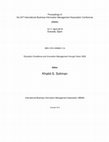
The paper focused on identifying major factors that cause inflation in Nigeria using secondary da... more The paper focused on identifying major factors that cause inflation in Nigeria using secondary data for 1981-2016. It specifically examined how the dynamics of key economic fundamentals like external debt, exchange rate, output growth rate, interest rate, fiscal deficits and money supply explain inflationary trend in Nigeria. Based on the result of the unit root test, the econometric technique of ordinary least squares was adopted in the study. The study produced strong empirical support for positive effect of exchange rate, fiscal deficits and money supply on inflation. However, there is no evidence from the study that output growth rate, external debt, and interest rate cause significant changes in inflation rate in Nigeria. Within the scope of our study, there is substantial evidence to conclude that inflation in Nigeria is driven by exchange rate dynamics, fiscal deficit and money supply.
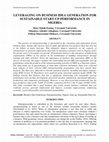
International Journal of Entrepreneurship, 2022
The practice of entrepreneurship is entrenched in the conception and exploration of new business ... more The practice of entrepreneurship is entrenched in the conception and exploration of new business ideas. Among other factors, lack of viable and efficient new business ideas has also led to the failure of many start-ups. This ultimately impacts negatively on the capacity of entrepreneurs to generate employment especially in emerging economies such as Nigeria where the private sector is becoming very pivotal. Of particular interest is the emergence of faith based organisations (FBOs) as key players in the mobilisation of budding entrepreneurs through training and other activities. Given the importance of business idea generation (BIG) to the success of start-ups, this paper examines the relationship between BIG and sustainable start-up performance using the products of the entrepreneurship activities of FBOs in a Nigerian context. The study made use of questionnaire as main data collection instrument. Data were collected from trainees of three selected FBO entrepreneurship programmes who have started their business. The data were subjected to relevant statistical analysis, including descriptive statistics using SPSS version 25. Hypotheses were analysed using structural equation model (SEM). The findings showed that business idea has a significant relationship with sustainable start-up performance (new product development, perceived customer satisfaction, operational efficiency, productivity and competitive positioning). However, it was discovered that productivity has the most predictive value at (β= 0.669, R 2 =0.448, t-statistics=10.953>1.96, P-value =0.000 <0.05). This study concluded that a good business idea would sustain business continuity that can eradicate poverty, generate employment and improve economic empowerment, reinforcing economic, social and possibly environmental sustainability.

International Journal of Social Economics, 2019
Purpose The industrial sector has been identified as one of the means to address the issue of une... more Purpose The industrial sector has been identified as one of the means to address the issue of unemployment due to its role in ensuring sustainable development. However, evidence from the Central Bank of Nigeria Statistical Bulletin reveals that the sector lags behind the agricultural and services sector in terms of its contribution to the gross domestic product. In light of this, the purpose of this paper is to ascertain whether the industrial sector development is a veritable tool in addressing the issue of unemployment in the long run for the Nigerian economy. Design/methodology/approach In order to determine whether industrial development is a veritable tool in addressing the issue of unemployment in the long run, the study makes use of the Autoregressive Distributed Lag model. The choice of this method over the commonly used Johansen co-integration approach is that it provides the mechanism to estimate the model in the presence of different order of integration among the macroec...

The book “The Nigerian Maladapted Financial System: Reforming Task and Development Dilemma” is an... more The book “The Nigerian Maladapted Financial System: Reforming Task and Development Dilemma” is an attempt at making government, financial authorities and other stakeholder in the financial industry devise better and more effective strategies to make the financial system be better positioned to perform its developmental functions in the Nigeria economy. The market entry of this book is being is timely, significant and highly relevant at this critical point in Nigerian history of finance education. It comes as a viable instrument in the face of the ongoing nation’s financial sector silent revolution and the inhabiting clamor for its regulatory reassessment, repositioning and ultimately total overhauling. This needed reassessment definitely calls for new manuals of ideas and realistic propositions for reshaping the operational framework of existing financial systems, whether maladapted, dilapidated or outdated. To the industry, the book could be perceived as a long-awaited instrument f...

ABSTRACT The book analyses the role financial intermediation plays in the economic growth of Nige... more ABSTRACT The book analyses the role financial intermediation plays in the economic growth of Nigeria. Globally, activities of banks reflect their unique role as the engine of financial growth which can ultimately lead to real economic growth. The importance of the financial sector of an economy in stimulating economic growth is widely recognized especially in developmental economics. Financial intermediation is the very core function of banks which could translate to this growth. It is an area in which banks have the professional expertise of matching the interest of depositors with those of borrowers by providing a coordinated interface for the two groups. This implies that where there is no intermediation, individuals and corporate bodies that want to invest in productive activities would have to accumulate enough funds over a long time to be able to meet their fixed and variable costs of investments. This book therefore analyses the Financial Interrelation Ratios (FIR) of the Nigerian financial intermediaries and highlights the catalytic role they can play at engineering financial development which in the long run could bring about the expected economic development of Nigeria.
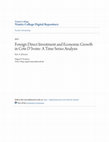
This paper investigates the impact of foreign direct investment (FDI) inflows on economic growth ... more This paper investigates the impact of foreign direct investment (FDI) inflows on economic growth in Cote D'Ivoire during the 1975-2011 period. The selection of this African nation is motivated by the rapid inflows it has experienced over the past decade. Using unit root and cointegration analysis, the resulting error correction model (ECM) suggests that gross fixed capital formation (GFCF) has a short-run positive impact on economic growth, while FDI, the repatriation of net income abroad, and periods involving structural breaks, have a negative effect on economic growth in Cote D'Ivoire. In addition, the negative error correction term indicates that deviations from long-run per capita growth during the current year are corrected relatively quickly in the following year, ceteris paribus. The unexpected negative effect of FDI on economic growth may be due to the significant repatriation of profits and dividends the country has experienced in recent years.
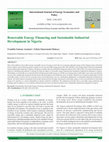
International Journal of Energy Economics and Policy
Due to the inability of renewable and non-renewable sources of energy to meet the ever-increasing... more Due to the inability of renewable and non-renewable sources of energy to meet the ever-increasing industrial energy need in Nigeria, there is therefore need to explore various financing option available to execute renewable energy project that will contribute to the energy basket which will sustainably impact industrial development in Nigeria. Obtaining secondary data from World development indicator from 1980 to 2021, the study utilized the auto-regressive distributed lag method to estimate the long run impact of renewable energy financing and sustainable industrial development in Nigeria. The findings reveal that the use of external debt for financing renewable energy as well the use of energy from Combustible waste source and alternate nuclear source significantly and positively determines the development of the industrial sector in Nigeria. while the use of taxation and donation to fund renewable energy as well as the use of energy source from hydroelectric were not contributing...
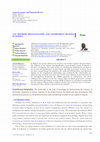
Asian Economic and Financial Review
In Nigeria, tax income collection has become a crucial policy goal for the government. The influe... more In Nigeria, tax income collection has become a crucial policy goal for the government. The influence of tax reforms and digitalization on government income in Nigeria is therefore investigated. The study focuses on evaluating the distributional outcomes of tax revenue and digitalization on both federal and state government revenues. An ex post facto research design was adopted in the study and both descriptive and inferential analysis of the hypothesized relationships was performed. The relationships are analyzed using secondary data from 1996 to 2020 and a dynamic framework based on the autoregressive distributed lag (ARDL) approach to cointegration. The study confirmed that company income tax reforms improved federal government revenues but inhibited state government revenues (SGR) in Nigeria. It is therefore recommended that the conduct of fiscal reforms in Nigeria should evolve to become more of a bottom–top approach where all tiers of government are included.
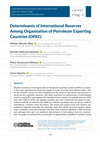
Comparative Economic Research. Central and Eastern Europe
Member countries of the Organisation of Petroleum Exporting Countries (OPEC) are always in the ne... more Member countries of the Organisation of Petroleum Exporting Countries (OPEC) are always in the news regarding the prices and supply of crude oil to the international market. One of the economic reasons for this is liquidity and the desire to accumulate international reserves by the respective countries. This paper examined the determinants of international reserves among the cartel against the backdrop of the motives for keeping reserves. With data from 2005 to 2018, the adopted variables that were tested with the system of generalised methods of moments (Sy‑GMM) are inflation, exchange rates, oil prices, crude oil dependence, economic crises and others. The results and outputs show that inflation was negatively impactful externally and internally, while FDI inflows recorded negative significance. Economic crises and economic openness were positively significant, while oil prices and exchange rates were not significant determinants of international reserves accumulation. The paper r...
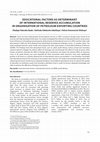
Baltic Journal of Economic Studies
Despite huge petroleum revenues with high development needs, the growth of international reserves... more Despite huge petroleum revenues with high development needs, the growth of international reserves in OPEC countries has been negligible. This study examined the impact of educational factors using different levels of literacy in stimulating the macroeconomic determinants of international reserves in OPEC member countries using data from 2008 to 2018 from World Bank Development Indicators for 15 member countries. The study used a dynamic panel model, and the data were analyzed using System of Generalized Method of Moments (SGMM). The results show that educational levels such as adult literacy, youth literacy, tertiary and secondary enrollment mitigate the negative impact of the exchange rate and stimulate the impact of crude oil prices, while tertiary enrollment stimulates the impact of foreign direct investment and reduces the negative impact of economic crises. Overall, youth literacy was most significant for these economies, while economic crises were significantly positive at all...
COVID-19 in the African Continent

Vision: The Journal of Business Perspective
Following the trend of granting autonomy to monetary authorities around the world beginning from ... more Following the trend of granting autonomy to monetary authorities around the world beginning from the mid-1900s, the Central Bank of Nigeria had its share of gradual autonomy from 1991 culminating in the 2007 legislation. This study investigated the effect of central bank autonomy (CBA) on the stock market index (SMI) in Nigeria with data on market index, foreign direct investment (FDI), gross domestic product per capita, inflation rate, terms of trade, trade openness and effective central bank autonomy index from 1985 to 2018. The study adopted the autoregressive distributed lag and Toda–Yamamoto and Dolado–Lutkepohl approach to Granger causality. The study finds that there is no long-run relationship between the variables estimated, though short-run relationships exist. CBA has a statistically negative impact on the SMI, while FDI has a positive significant relationship with the SMI only in the short run. The only significant causality runs from FDI to SMI. The study, therefore, re...
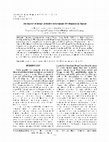
This study investigates the impact of Deposit Money Banks' (DJ\1Bs) activities on economic de... more This study investigates the impact of Deposit Money Banks' (DJ\1Bs) activities on economic development in Nigeria. The study aims at establishing the rmderlying factors of banks' activities that influence economic growth. A structured questionnaire was used to elicit information from the respondent in banks in Nigeria. The data gathered were analyzed using SPSS (Statistical Packages for Social Sciences) to generate frequency percentages and also nm tests using One sample Test and Anova. After thorough analysis of data collected, from the findings it was observed that Deposit Money Banks (DJ\1Bs) activities do have a significant impact on economic development in Nigeria. Thus it can be concluded that banks activities play a major role in the economy. It was therefore recommended that banks should improve on the mobilization of resources and how such resources are allocated. This would help them in pricing and trading off risk, channeling of fund and also in effective implemen...

The Journal of Internet Banking and Commerce, 2017
Africa unlike other developing regions of the world has experienced declining flows of foreign di... more Africa unlike other developing regions of the world has experienced declining flows of foreign direct investment (FDI).The flow of FDI is expected to result into gradual reduction in reliance on external borrowed capital and acceleration of economic development. The study examined the declining flow of FDI to the African regions as well as the impact that it has had on economic development of the region, using the proxies of Income per capita, Life expectancy and Education indices. The study made use of pooled data from thirty nine African countries within the period 1993 and 2012.The method of analysis utilized for the study was the fixed effect least-square dummy variable model, employed to estimate the impact of foreign direct investment on economic development for the selected host African countries. The study finds that foreign direct investment is statistically significant in relation to economic development for host African countries. It is therefore recommended that the gove...
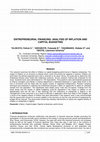
This research examines the effect of inflation on capital budgeting performance in Nigerian enter... more This research examines the effect of inflation on capital budgeting performance in Nigerian enterprises. The impact of inflation on an economy is diverse which could concurrently be negative or positive. Inflation can grind down the definite expected return that is received on an asset. Hence, the study sets to determine how enterprises behave when faced with inflationary pressure. Survey research method was employed for the study. Questionnaires were administered to 100 respondents. The questions were administered purposively to finance managers and officials in finance department in selected enterprises in Lagos State which is the hub of commerce and the State with the largest number of registered entrepreneurs. Random sampling technique was employed in selecting the enterprises because it offers an opportunity to select an unbiased sample from the population. The hypotheses were tested using T-test and Chi-square. Findings from the study shows that the impact of capital budgeting...










Uploads
Papers by Prof. Felicia O . Olokoyo